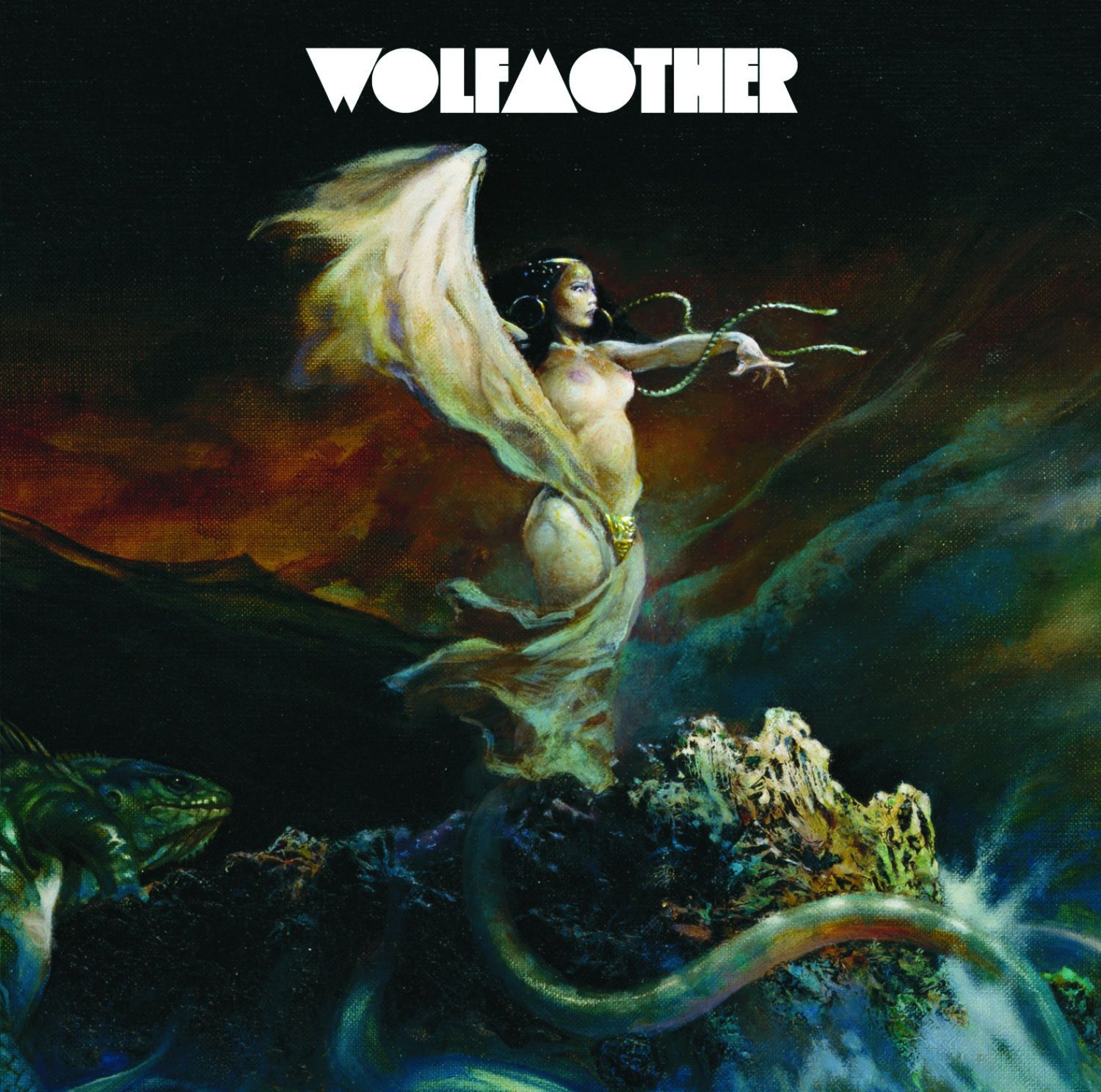Wolfmother formed in Sydney in 2000 and, for several years, remained virtually unknown outside of their local circuit. But that all changed with the Australian release of their self-titled debut in October, 2005.
Following the release of Wolfmother, the trio – Andrew Stockdale (guitar, vocals), Chris Ross (bass, keyboard) and Myles Heskett (drums) – became a household name. The singles Woman and Joker & The Thief permeated the decade’s musical landscape, whilst the record as whole – alongside albums like Songs for the Deaf by Queens of the Stone Age, Black Holes & Revelations by Muse, and Elephant by The White Stripes – helped pull hard-hitting, psychedelic rock ‘n’ roll into the 21st century.
The question is, how did a bar band from Australia become one of the most talked about acts in the world, seemingly overnight?
“We’d been touring all over the place,” says Stockdale. “We didn’t sit on our arses and pat ourselves on the back being happy with just playing Australia. From the very start, we were out there playing everywhere and literally losing money, racking up debt as we went.”
Their dogged perseverance paid off, and after four years of touring the country’s pubs and clubs the band were signed by Australian record label Modular Recordings, who released their self-titled EP in 2004. The record did reasonably well for an unknown act, reaching number 35 in the ARIA Singles Charts, and after six months of additional touring the group began work on their first full-length effort.
Recorded in Los Angeles with producer Dave Sardy (Oasis, Marilyn Manson), their eponymous debut came out in Australia on October 31, 2005, and was released internationally via Interscope Records the following year.

“When we came to America, it was like putting the brakes on everything,” Stockdale remembers. “We stopped touring and playing shows, because this was our first foray into a professional studio. We were signed to a major label in America, and it was the first time we’d worked with a proper producer and had more than one guitar, three pedals and one amp. We were spoilt for choice. But we did the best we could, under the circumstances.”
Spoilt for choice was exactly what they were. The drum parts for the debut album were laid down at Sound City Studios, where everyone from Neil Young and Tom Petty to Nirvana and Rage Against The Machine had recorded, whilst the bass and guitars were done at Pass Studios in Burbank, and the vocals were completed at The Sound Factory in Hollywood. It must’ve all been a rather exhilarating experience for the young musicians from down under.
“It was great,” says the frontman. “It was a great atmosphere. That was the first time we’d met an actual drum tech. We met this guy called the Drum Doctor who did all the drums at Sound City, and he showed us how to change that ride cymbal for the chorus, and change that snare for the next song, or the toms for this, and how to get that vintage sound that we were after. He had this truck out the back of the studio and he’d load in 1950’s kicks and 1970’s rack toms. We were really thrown in the deep end with all this madness and production expertise.”
With the help of audio experts like Ross ‘The Drum Doctor’ Garfield and Sardy at the helm, Stockdale and his bandmates created a body of work that contained the kind vintage virtues heard on many of the great hard rock albums made during the 1970s, and their music was compared – favourably, for the large part – to the likes of Black Sabbath, Deep Purple, Led Zeppelin and Blue Cheer. But apparently it was never their intention to emulate the masters of the genre as they didn’t even know whom half of them were.
“I was 27 at the time – and you’re not going to believe this – but I didn’t even know who Deep Purple or Blue Cheer were. I had a Best Of Black Sabbath record, and that was the extent of my ‘70s hard rock knowledge. Once we’d written Woman and Joker [& the Thief], people were giving us all these Deep Purple and Blue Cheer comparisons, but we didn’t even know who they were. And it was better that we didn’t know, because we had no reference point. We just thought power chords sounded cool. It’s like, when you start off with a new guitar or a new camera, and you have that moment where you just feel really inspired. That’s what we had. We had this inspired moment where we could just dial it in with no inhibitions or concerns.”
We’ll give the generously-haired frontman the benefit of the doubt, since you can hear lots of contemporary and electronic music in the Wolfmother sound as well. Their debut was, after all, very much in tune with the garage-rock revival of the mid-00s, led by bands such as The White Stripes and Australia’s very own Jet (Dave Sardy also produced their debut album Get Born) and The Vines. But we refuse to believe that Led Zeppelin, and Robert Plant’s vocals in particular, didn’t influence the sound of Wolfmother’s debut album.
“What I had from Led Zeppelin was How the West Was Won [a triple live album released in 2003], and tapes of their first performances at the Royal Albert Hall”, Stockdale begins as he mischievously dances around the issue of influence. “I really enjoyed that footage and the interplay that the band had. It was almost like a jazz band. Each member would be put on the spot, and it was great. No disrespect to their later performances from Madison Square Garden where everything was really over the top and they were wearing one-piece outfits, but I didn’t take anything from that period. That’s what everyone says though, isn’t it? ‘I only like the early stuff!’ That’s what people say to me now!”

That admiration was reciprocated when Led Zeppelin asked Wolfmother to appear as their guests when they were inducted into the UK Music Hall of Fame in 2006, and the trio appeared alongside their idols covering Communication Breakdown – a song that’s since become a staple of their own live set.
But going back to what Stockdale said about liking the “early stuff”, you can understand why people might be inclined to favour the Wolfmother album over their later releases. In 2008, co-founding members Ross and Heskett left the band due to “irreconcilable personal and musical differences”, whilst the frontman continued to use the Wolfmother moniker with a revolving door of new musicians.
The band’s second album Cosmic Egg was released in 2009, and the long-awaited New Crown followed in 2014. But for many the departure of Ross and Heskett marked the end of Wolfmother, whilst Stockdale has been openly criticized in the press and blamed repeatedly for their departure.
So what really happened? Why did the other two original members leave the band the year after releasing one of the most successful debut albums in rock history?
“I don’t know”, replies the last remaining original member. “I seriously don’t know. I don’t know if you kept track of what we did back then, but we toured our arses off all the time. We were everywhere. I guess that life just wasn’t for them.”
Wolfmother contained no less than six hit singles, and the band’s music appeared in numerous video games, films and adverts. The landmark debut also won Best Breakthrough Album and Best Rock Album, while the band took home Best Group at the 2006 Australian ARIA Music Awards, and the hit single Woman won the prize for Best Hard Rock performance at the Grammy Awards in 2007, by which point the album was certified five times platinum. But how did such unprecedented levels of success affect Stockdale’s life a decade ago?
He pauses.
“Put it this way”, he begins, “my parents used to have a tiny little car that they drove from Tawonga to Brisbane to visit their family on the weekend, and whilst we were in the middle of touring I said to my dad, ‘Seeing as though things are going so well with the band, I’ll buy you a car.’ I was thinking he’d pick like a little Toyota – a humble and low cost vehicle – and he sent me a bill for a Chrysler Charger. I didn’t even own my own car at this point, and I bought my dad a Chrysler. So that’s how it affected my life.
“It also put some money in the bank,” he adds. “I think I was the first person in my family to buy a house, too. No one in my family had ever owned their own house, and I paid off mine by the time I was 30. I grew up with my parents paying off their mortgage their whole life, and I’d done that by the time I was 30, so I was like, ‘What do I do now?’ It’s not just about that though. It’s nice to make some money and do those things, but it’s also about touring and connecting with the people who’ve supported you and put you there. And musicians need to play. That’s why you start in the first place. If you’re not playing then you lose it.”
An expanded re-release of Wolfmother’s debut is out now, including a special vinyl edition. The band will release their fourth album in early 2016.

